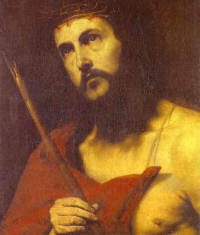Lent: April 11th
Tuesday of Holy Week

MASS READINGS
April 11, 2017 (Readings on USCCB website)
COLLECT PRAYER
Almighty ever-living God, grant us so to celebrate the mysteries of the Lord's Passion that we may merit to receive your pardon. Through our Lord Jesus Christ, your Son, who lives and reigns with you in the unity of the Holy Spirit, one God, for ever and ever.
Recipes (1)
Activities (10)
- A Jonas (Jonah) Project
- Holy Week in the Catholic Tradition
- Housecleaning for Holy Week I
- Housecleaning for Holy Week II
- Jonas and Holy Week
- Lent Hymn: Open, O Hard and Sinful Heart!
- Monday, Tuesday and Wednesday of Holy Week in the Home
- Music for Lent and Easter: St. Matthew Passion by Bach
- Spring Cleaning
- The Passover Meal: 1. Introduction
Prayers (6)
- Prayer for Tuesday of Holy Week
- Prayer Before a Crucifix
- Prayer for Palm Sunday and Holy Week
- Way of the Cross
- To Keep A True Lent
- Family Evening Prayer for Holy Week
Old Calendar: Tuesday of Holy Week
"False witnesses have stood up against me, and my enemies threaten violence; Lord, do not surrender me into their power!" Our Lord calls upon His heavenly Father to shield Him against His enemies. In God's providence, however, the Cross of Christ was destined to be a sign of glory and not an emblem of shame: from that Cross came victory over Satan, from it came life, resurrection and salvation: "It behooves us to glory in the Cross of our Lord Jesus Christ in whom is our salvation, life and resurrection, by whom we are saved and delivered."
On the Cross Our Lord expiated our avarice by His extreme poverty, our sensuality by His most bitter sufferings, our pride by His profound humiliations, our disobedience by His most perfect submission to the Will of God. Embracing us with His extended arms He draws us into the path which He has trod and which alone leads to life eternal. — Cathedral Daily Missal
The feast of St. Stanislaus, which is ordinarily celebrated today, is superseded by the Holy Week liturgy.
Meditation
Today, again, our Savior sets out in the morning for Jerusalem. His intention is to repair to the temple, and continue His yesterday's teachings. It is evident that His mission on earth is fast drawing to its close. He says to His disciples: "You know that after two days shall be the Pasch, and the Son of Man shall be delivered up to be crucified."
On the road from Bethania to Jerusalem, the disciples are surprised at seeing the fig-tree, which their divine Master had yesterday cursed, now dead. Addressing himself to Jesus, Peter says: "Rabbi, behold, the fig-tree, which Thou didst curse, is withered away." In order to teach us that the whole of material nature is subservient to the will of God, Jesus replies: "Have the faith of God. Amen I say to you, that whosoever shall say to this mountain: Be thou removed and cast into the sea! and shall not stagger in his heart, but believe that whatsoever he saith shall be done, it shall be done unto him."
Having entered the city, Jesus directs His steps towards the temple. No sooner has He entered, than the chief priests, the scribes, and the ancients of the people, accost Him with these words: "By what authority dost Thou do these things and who has given Thee this authority, that Thou shouldst do these things?" We shall find our Lord's answer given in the Gospel. Our object is to mention the leading events of the last days of our Redeemer on earth; the holy volume will supply the details.
As on the two preceding days, Jesus leaves the city towards evening: He passes over Mount Olivet, and returns to Bethania, where He finds His blessed Mother and His devoted friends.
— The Liturgical Year, Abbot Gueranger O.S.B.